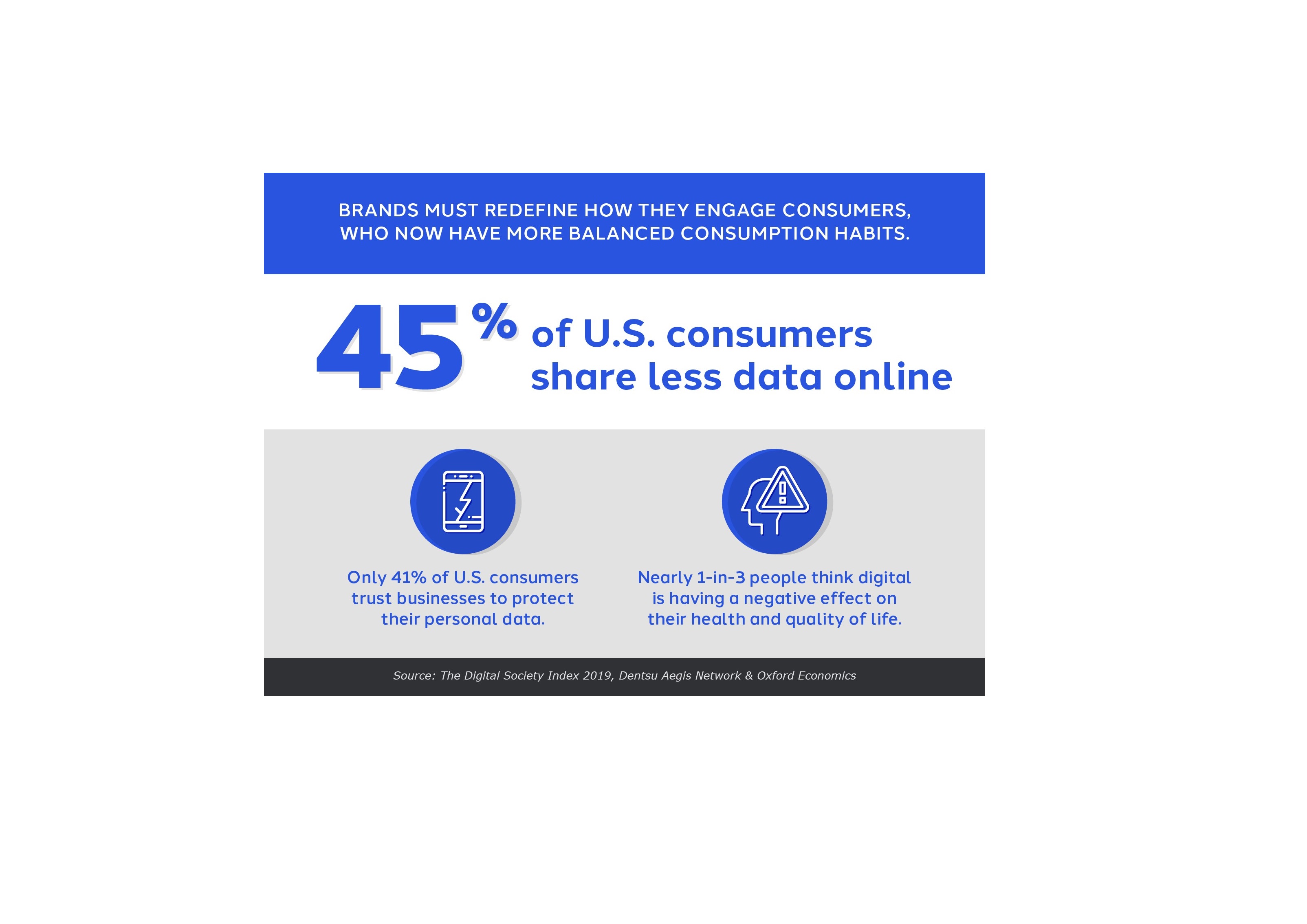As Marketers Drive Digital and Data Agendas, U.S. Consumer Awareness and Skepticism Increases, With Implications for CMOs: Survey

Here's more reason for CMOs to take heed of the human at the center of effective marketing strategy.
The United States is the most dynamic digital economy globally. But U.S. consumers are the least trustful of business and highly protective of their personal data. That's according to a new survey from Dentsu Aegis Network called "The Digital Society Index 2019: Human Needs in a Digital World." The communications-services network partnered with Oxford Economics to survey 43,000 people around the world.
That paradox has great implications for marketers seeking to continually move toward a data-driven, digital and automated construct of brand engagement.
Singapore follows the United States in digital dynamism, followed by the United Kingdom and Germany, according to the survey, which also found that 77% U.S. consumers are more likely to shop online; 70% are more likely to watch TV via a streaming device; and 60% are more likely to use an app to conduct their banking or manage their money.
Still, ironically, U.S. consumers are reluctant to share data online. Almost half of respondents have done things to reduce their online footprint, because only 41% believe that businesses holding their personal data will protect their privacy.
Part of the rise in suspicion around personal-data protection has been caused by, again ironically, the rise in people's awareness of, understanding and criticism of how companies and institutions use their data, according to the survey. And most people said they would stop doing business with entities that misuse their data—no matter the industry.
And of course, there's the issue of personal health and quality of life as it related to digital use: The survey found that only a third of U.S. consumers believe that digital activities have a positive effect on health and well-being; 44% globally feel the same way. And 60% of U.S. consumers believe that social media has a negative impact on political conversation, which is 15% higher than globally. As a result, 72% of respondents said they are doing things to limit their digital activities.
The most interesting paradox of all is that the people most likely to embrace and understand the complexities of digital are also the ones most likely to eschew it.
"Perhaps the most surprising finding is that consumers with the greatest propensity to use digital products and services are the ones most likely to scale back on digital. They are the actively looking to reduce their sharing of data, to limit their time spent with digital devices, to increase their use of ad-blockers and to delete their social media accounts. This raises the bar for marketers as to how they can effectively engage the very consumers that had been driving force behind the world's digital transformation," said Dirk Herbert, U.S. Chief Strategy Officer, Dentsu Aegis Network, in an email. "The 'paradoxes' within this report are a reflection of consumers' trying to balance their enthusiasm for digital services with a growing understanding of the unintended and less desirable consequences of digital technologies on our lives," Herbert said. "It's a reflection of consumers' growing sophistication in understanding that the embrace of digital services comes with trade-offs and trying to find their comfort zone – one where they can tap the best of what digital has to offer but do so in a way that gives them back a sense of control over their lives, their privacy and their data." So, what does it all mean for brands?
"The key for CMOs is to figure out how to stop just marketing at consumers and instead start mattering to people," Herbert said. "That will require a mindset shift from unfettered use of data in service of the brand's agenda to responsible and judicious use of data in service of the consumer's agenda. Marketers have to be more transparent about their data policies, empower consumers with greater control over how their data is being used, step up efforts to safeguard privacy and actively demonstrate digital's ability to create positive change by leveraging digital marketing for good, not just for growth."
Click the social buttons above or below to share this story with your friends and colleagues.
The opinions and points of view expressed in this content are exclusively the views of the author and/or subject(s) and do not necessarily represent the views of MediaVillage.com/MyersBizNet, Inc. management or associated writers.

